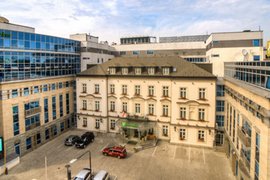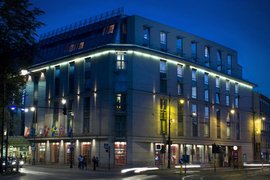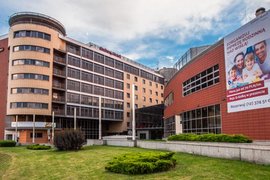Destination Search
Filter Results
-
Accessibility
-
Board Basis
-
Accommodation Type
-
Holiday Type
-
Star Rating
-
The UK's largest accessible holiday specialist
-
Guaranteed accessible accommodation
-
Many properties personally audited
-
Flights, adapted transfers & equipment hire
Disabled Holidays in Poland
All Locations in Poland
View all 15 locations in Poland-

Luxury City Centre Hotel
Krakow- Bed and Breakfast, Room only
- City Breaks, Pet Friendly
- 236 bedrooms
- Hotels
- 5 Stars
A former 19th-century palace, this luxury five-star hotel is conveniently situated in the centre of Krakow, just a few steps away from the historic Old Town.







-

Five-Star City Centre Hotel
Krakow- Bed and Breakfast, Room only
- City Breaks
- 196 bedrooms
- Hotels
- 5 Stars
A fantastic wheelchair-accessible located only a few minutes from the Main Market Square and some of Krakow’s most attractive tourist spots.






-

Luxury 5 star hotel
Krakow- Bed and Breakfast
- Hotels
- 5 Stars
Established as one of the city’s finest 5-star hotels, the charm of the area outside ...





-

Accessible 4 Star Hotel
Krakow- Bed and Breakfast, Room only
- City Breaks
- 194 bedrooms
- Hotels
- 4 Stars
This award-winning hotel occupies a prime location in the beautiful city of Krakow, next to the old district of Kazimierz.




-

Accessible Hotel
Sopot- Room only
- Hotels
- 2 Stars
Best Western Villa Aqua Sopot is a charming 2-star hotel offering comfortable accommodation near the heart of Sopot. Highlights include an onsite restaurant, free Wi-Fi and parking and an excellent location close to the beachfront.

-

Accessible Hotel
Szczecin- Room only
- Hotels
- 2 Stars
Location. Ibis Szczecin Centrum is located in Szczecin, close to Cathedral Basilica of St. James the Apostle, National Museum of Szczecin, and Pomeranian Dukes' Castle. Hotel Features. Ibis Szczecin Centrum features a restaurant and a bar/lounge.

-

Accessible Hotel
Gdansk- Room only
- Hotels
- 3 Stars
Location. Hotel Bartan is located close to the beach in Gdansk. Hotel Features. Hotel Bartan features a restaurant and a bar/lounge. Room service is available during limited hours. The hotel serves a complimentary hot and cold buffet breakfast.

-

Accessible Hotel
Wroclaw- Room only
- Hotels
- 4 Stars
Property Location With a stay at Platinum Palace in Wroclaw, you'll be close to Wroclaw Race Course and Rynek. This 5-star hotel is within close proximity of Polish Theatre in Wroclaw and Wroclaw Philharmonic.

-

Accessible Hotel
Wroclaw- Room only
- Hotels
Property Location When you stay at Haston City Hotel in Wroclaw, you'll be connected to the convention center and close to Millennium Bridge and Wroclaw Cathedral. This 4-star hotel is within close proximity of Museum of Archeology and Wroclaw University.

-

Accessible Hotel
Warsaw- Room only
- Hotels
- 4 Stars
The hotel is a friendly 4-star hotel offering comfortable accommodation in the heart of Warsaw.

-

Accessible Hotel
Rawa Mazowiecka- Room only
- Hotels
- 4 Stars
The hotel is located in the heart of the Masovian region, in the town of Rawa Mazowiecka, just a quick ride away from the centre of Warsaw.

-

Accessible Hotel
Zamosc- Room only
- Hotels
- 3 Stars
Located in the centre of Zamosc, close to the town hall, the academy and the palace. The railway is just 1 km away. The rooms are simply decorated and furnished, and are clean and comfortable, though a little dated in appearance. They are medium sized.

-

Accessible Apartment
Zakopane- Self Catering
- Apartments
- 3 Stars
General Description: 3 star accommodations Great combination for business and pleasure Beautiful views and exceptional service Designed to meet families needs Perfect for weekend getaway Location: Conveniently located in Zakopane Centrally located

-

Accessible Hotel
Katowice- Room only
- Hotels
- 4 Stars
This modern business and conference hotel with state-of-the-art technology is a great choice for a pleasant stay in Katowice. The rooms and apartments feature a mix of deep black, coral red, yellow and white tones.

-

Accessible Hotel
Wroclaw- Room only
- Hotels
- 5 Stars
The Granary - La Suite Hotel is a classic 5-star property offering elegant accommodation in the heart of Wroclaw. Highlights include a luxury spa offering a range of treatments, free Wi-Fi and an excellent location close to Rynek Markey Square.





